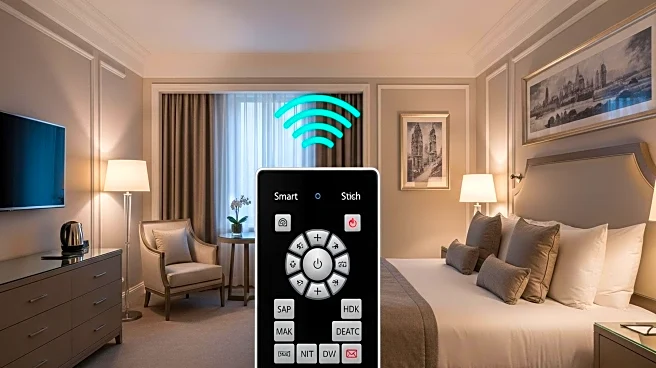What is the story about?
What's Happening?
Hotels are increasingly incorporating smart automation into their design processes to create dynamic and personalized guest experiences. This approach transforms hotel rooms from static spaces into responsive environments that cater to guests' emotional and physical well-being. Smart controls allow for personalized welcomes, such as adjusting lighting and curtains upon a guest's arrival, and maintaining optimal air quality through IoT sensors. These technologies aim to create a sanctuary for guests, promoting better sleep and reducing stress by aligning lighting with natural circadian rhythms and masking ambient noise.
Why It's Important?
The integration of smart controls in hotels represents a significant shift in the hospitality industry, focusing on enhancing guest satisfaction and well-being. By offering personalized experiences, hotels can differentiate themselves in a competitive market, potentially increasing customer loyalty and repeat business. The use of technology to improve air quality and reduce noise pollution also highlights a commitment to guest health, which can be a deciding factor for travelers. Additionally, these innovations can lead to energy efficiency and cost savings, aligning with sustainability goals and improving operational ROI.
What's Next?
As smart automation becomes more affordable and accessible, more hotels are likely to adopt these technologies, including retrofitting older properties. This trend could lead to widespread changes in hotel design and operations, with a focus on creating personalized and health-oriented environments. The hospitality industry may see increased collaboration with tech companies to develop new solutions that further enhance guest experiences. Stakeholders, including hotel chains and technology providers, will need to address potential challenges such as data privacy and integration costs.
Beyond the Headlines
The use of smart controls in hotels raises ethical considerations regarding data privacy and the extent of automation in personal spaces. As hotels collect data to personalize experiences, they must ensure robust security measures to protect guest information. Additionally, the shift towards automated environments may impact employment in the hospitality sector, requiring new skills and roles focused on managing and maintaining these technologies.















